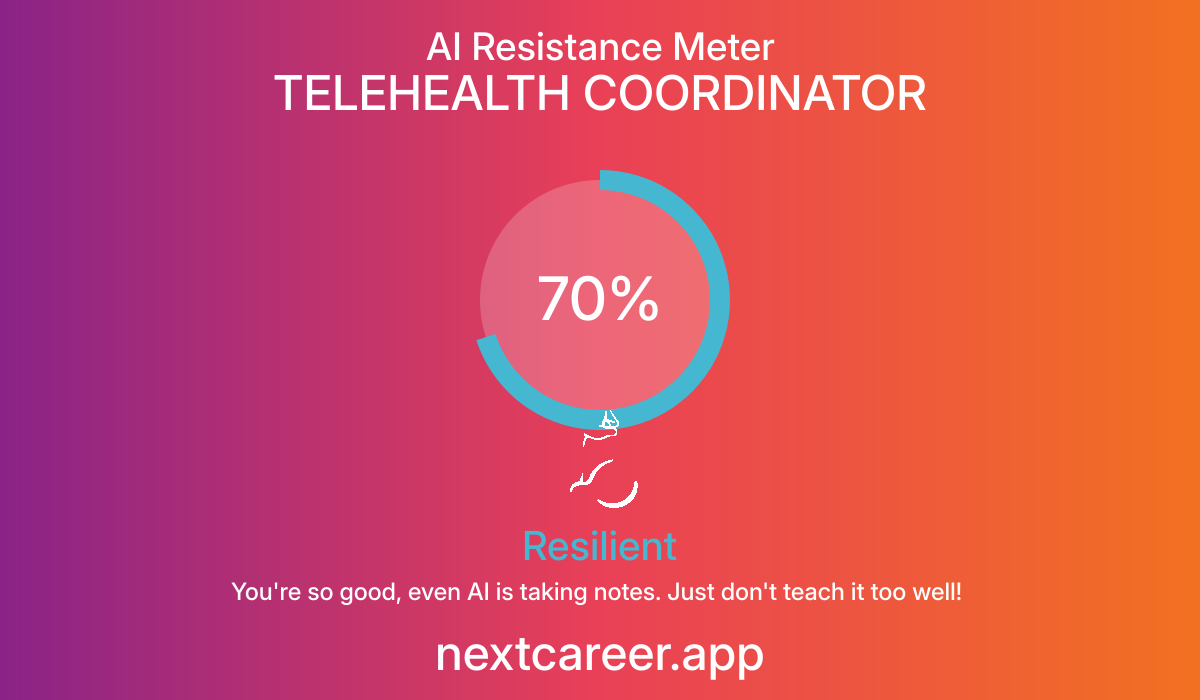AI Resistance Analysis
TELEHEALTH COORDINATOR
TELEHEALTH COORDINATOR
AI Resistance Score
AI Resistance Meter
Resilient
TELEHEALTH COORDINATOR
You're so good, even AI is taking notes. Just don't teach it too well!
The role of a Telehealth Coordinator demands a unique blend of cognitive tasks, emotional intelligence, and organizational capabilities that make it relatively resistant to complete automation by AI technologies in both near-term and long-term scenarios. However, certain aspects of the role such as scheduling, analytics, and routine care follow-ups can be augmented by AI, leading to some vulnerabilities.
The role of a Telehealth Coordinator demands a unique blend of cognitive tasks, emotional intelligence, and organizational capabilities that make it relatively resistant to complete automation by AI technologies in both near-term and long-term scenarios. However, certain aspects of the role such as scheduling, analytics, and routine care follow-ups can be augmented by AI, leading to some vulnerabilities.
Key Factors
- Cognitive Tasks: AI systems can effectively manage data and analytics related to patient care and resource allocation, making certain cognitive tasks more automatable.
- Emotional Intelligence: The need for empathy, patient engagement, and communication remains critical, areas where human interaction far surpasses AI capabilities.
- Physical Skills: This role does not include significant physical labor, thus it's largely insulated from displacement by robotics.
- Creative Thinking: Adapting telehealth services to meet patient needs and addressing unique use cases requires innovative problem-solving, which is still a human forte.
Human Advantages
- Ability to navigate complex human emotions and build trust with patients.
- Skill in interpreting nuanced patient needs which is not easily programmable into AI systems.
- Flexibility in adapting services to changing patient demographics or new healthcare regulations.
AI Vulnerabilities
- Data management tasks could be automated by AI systems.
- Standard patient follow-ups and scheduling could be optimized through AI, reducing the need for humans in routine processes.
Recommended Actions
- Invest in training programs that develop emotional intelligence and negotiation skills among Telehealth Coordinators.
- Explore partnerships with tech companies to integrate AI tools that enhance rather than replace human capabilities.
- Engage in continual education regarding telehealth technology advancements to stay ahead in the field and understand AI's role in patient care.
In the near-term (5 years), AI tools will enhance Telehealth Coordinators by streamlining administrative tasks, allowing them to focus on more complex patient interactions. In the long-term (20+ years), while AI can take over routine data tasks, the need for insightful human coordination, particularly in ethical decision-making and patient relations, will keep this role relevant and critical in the healthcare ecosystem.

Why Calculate AI Resistance?
Understanding how AI-resistant your career is becoming increasingly important in today's rapidly evolving job market. Our analysis combines multiple factors including required human skills, technological adaptability, and future industry projections to give you a comprehensive view of your career's sustainability.